anxiety & aggression support
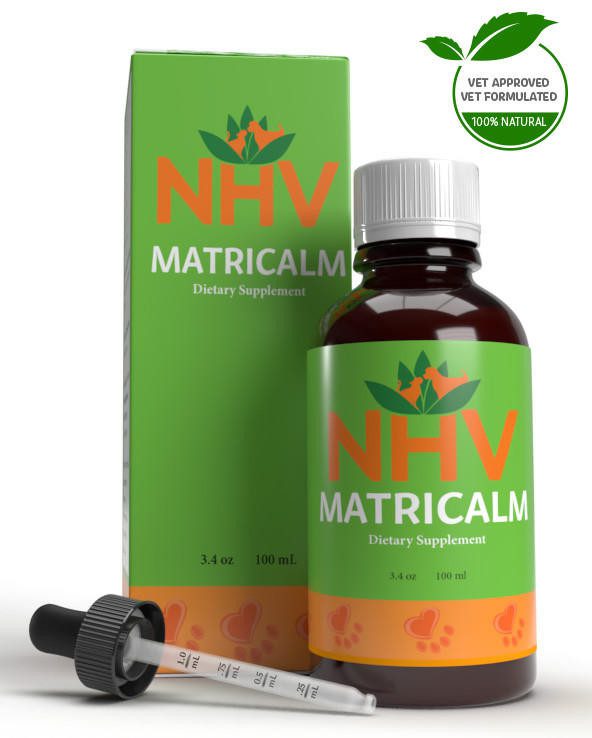
free shipping over $100 (USA & Canada)
1-877-937-4372 the pet expert hotline
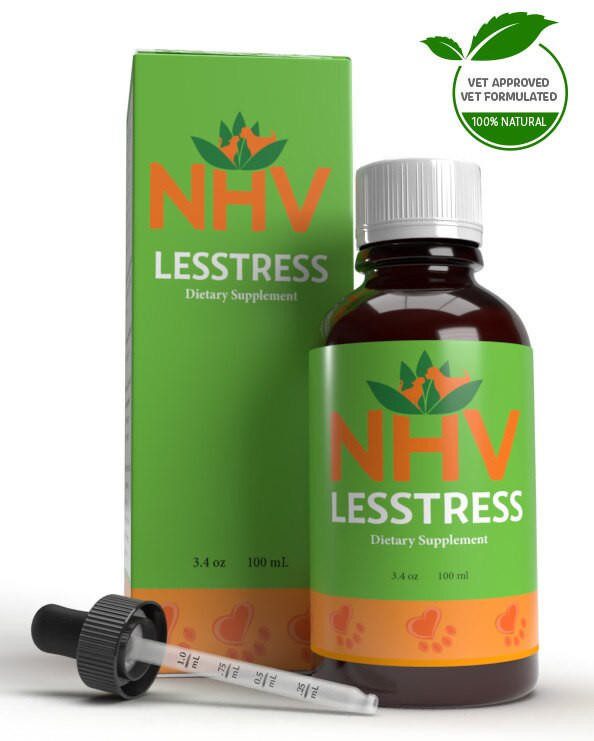

If you’ve heard of the term fear aggression in dogs and cats, you probably know the importance of mental wellness in your pet’s life. Behavioral concerns in your little one can make coexistence harder, but it can also lead to physical or emotional harm to your beloved pup or kitty.
Fear is the most common trigger of aggression in dogs and cats.
It’s important to remember that pets that display aggression are not mean or evil. Seeing as our little ones can’t speak to us, they use body language to alert us when something is wrong. Aggression is a common form of communication in animals. It’s their way of expressing their fear, anxiety, or nervousness and protecting themselves the only way they know how.
Aggressive behavior in dogs and cats is typically defensive in nature. Pets usually display this behavior to increase the distance between themselves and the perceived threat or to communicate a clear message of “stay away.” And as their parent and tutor, it is our responsibility to listen and help!
Aggression in dogs and cats can be a sign of several mental concerns, but it can also be physically related, including pain and disease as root causes. Please take your little one to the vet to rule out any severe underlying conditions that might be causing these changes in your little one’s behavior.
However, fear is the most common trigger of aggression in dogs and cats. This behavior can occur when a pet feels threatened, cornered, or trapped. Anxiety-related aggression can also occur when an animal is triggered by a stimulus that reminds them of previous experiences where this behavior might have been necessary to avoid or prevent unpleasant outcomes.
Triggers may include developmental issues such as abuse, trauma, improper socialization, environmental factors such as confinement, large groups, or even genetic predisposition in certain breeds.
Why is fear aggression in dogs and cats a concern to your little one’s mental and physical health? When an individual experiences fear, it triggers the nervous system and sends a cascade of information to prepare the body for fight-or-flight.
The amygdala is the first of multiple brain centers that sense fear. It then signals to the cerebral cortex, which becomes impaired and is responsible for reasoning and judgment. This is why your pet may begin to act out of character to items, people, and even you.
This cascade of stimuli then reaches the hypothalamus, which communicates to the pituitary gland to secrete adrenocorticotropic hormone (ACTH) into the blood, which will trigger the adrenal gland to secrete additional stress hormones like cortisol and adrenaline. These hormones increase blood pressure, heart rate, and breathing. Muscles can become tighter, and metabolic activity can cause glucose spikes.
Constant exposure and ongoing stress on the body can have many detrimental effects on your furkiddo’s body, from heart disease to stroke, diabetes, anxiety, or even depression. Natural supplements can help protect your little one’s body from stress-induced issues.

As chronic stress does a number on our little one’s endocrine system, and their liver is responsible for metabolizing these hormones, we need to ensure it is functioning optimally. That’s why NHV Milk Thistle can also be really beneficial if your furkiddo has been dealing with anxiety-related aggression. Milk Thistle has strong detoxification properties, supports liver regeneration, and helps prevent hormonal imbalance.
Stress can also induce excessive inflammation and strain on the immune system. The antioxidant benefits of NHV Turmeric are great as these phytonutrients protect your body from free radicals that are known to damage cells. Turmeric is also highly supportive of the heart and circulatory system, ensuring its regular functioning and operation.
Lastly, fear aggression in dogs and cats can lead to an unregulated nervous system, which can strongly affect the immune system and its functioning as it is always hyperactive and ready to take on the “threat.” NHV Natures Immuno‘s mushroom formula can support an unregulated immune system while helping combat stress with its adaptogenic properties. Adaptogens help our bodies manage stress and restore balance after a stressful situation.
Fear aggression is a complex behavioral trait that requires careful handling. It is crucial to avoid scolding or punishing a fearful dog, as this may reinforce their feelings and increase the likelihood of aggressive behavior. Instead, proper exercise, diet, natural supplements, and training are good starting points in helping alleviate many fear-related problems.
Avoid scolding or punishing a fearful dog, as this may increase the likelihood of aggressive behavior.
When it comes to training, various behavioral methods could be attempted, like desensitization and regular obedience. Desensitization employs threats and praise in conjunction with the presence of the feared object to reduce fear and increase familiarity. Regular obedience training may mitigate fear and anxiety, reduce the likelihood of aggressive responses, and serve as a counter-conditioning treatment to distract the dog from negative stimuli.
Natural calming supplements like NHV Lesstress for dogs and NHV Matricalm for cats can help make your little one’s training experience less stressful. These formulations were designed to reduce hyperactivity and excitability and can even help your little one’s body to better cope with their stress triggers. Both Lesstress and Matricalm can also support the immune and nervous systems and help the body adapt when experiencing fear aggression without strong sedative effects.
Chronic long-term stress can lead to further issues if unaddressed. The severity and underlying trigger will help determine the appropriate treatment alongside your vet. Talk to one of our pet experts to build the best regime for your furmily to handle fear aggression in dogs and cats.
anxiety & aggression support

Natural Help for Stress Reduction, Anxiety Relief, Behavioral Problems, and Aggression in Cats
buy 2 and save $3
3 month supply for a small to medium size pet
Matricalm is an all-natural supplement that provides anxiety and stress relief in cats and promotes calm behavior.
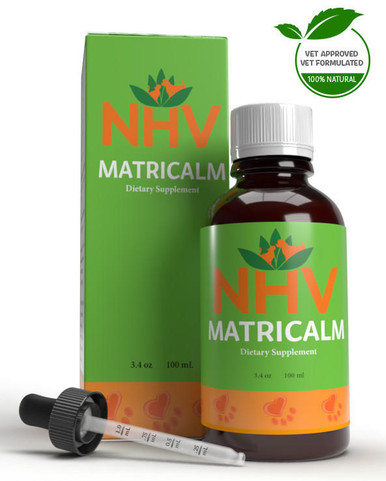
Matricalm is an all-natural supplement that provides anxiety and stress relief in cats and promotes calm behavior.
Help reduce aggressive behavior and provide anxiety and stress relief for your cat with Matricalm, a natural herbal product designed to help reduce excitability in your pet. Cats can become anxious or aggressive when exposed to other animals or to people they are unfamiliar with. When this occurs they may hiss, scratch, howl, or urinate inappropriately.
It’s important to remember that a significant cause of illness in pets results from stress. Helping to keep your cat stress free can help keep them healthier for longer. NHV Pet Experts also often recommend Matricalm for cats dealing with FIV, cancer, kidney issues, hyperthyroidism, and more.
See how NHV Matricalm helped kitty Kimba with yowling and stress.
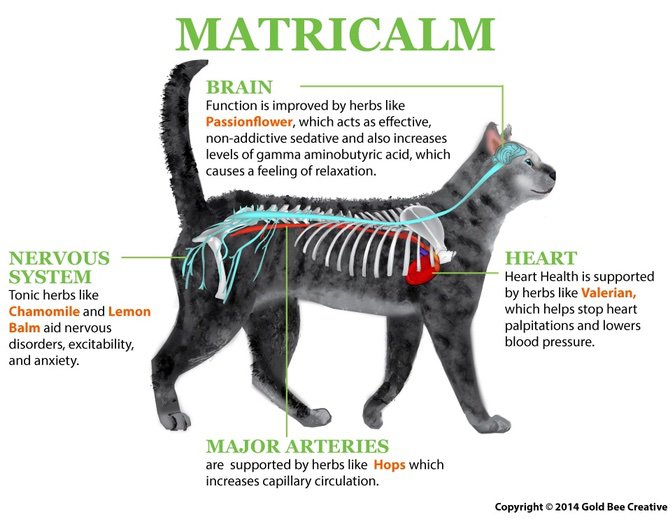
Chamomile – Contains sedative properties. Chamomile also helps the immune system and has a strong affinity for the nervous system.
Passion Flower – An effective, non-addictive sedative. It helps increase gamma-aminobutyric acid (GABA) in the brain, which helps cause a feeling of relaxation. Passion Flower also has strong anti-inflammatory and pain-relieving properties.
Lemon Balm – An aromatic herb used for nervous disorders, excitability, and anxiety. In addition, lemon balm helps lower blood pressure.
Valerian – Helps stop heart palpitations, relaxes spasms, relieves pain, and regulates the nervous system. Valerian also helps improve sleep latency and sleep quality.
Hops – Tension, anxiety, and stress relief in cats. Hops have traditionally been used to help with mood disturbances, such as restlessness and anxiety.
Select your pet's weight to determine the correct dose.
To be taken twice daily. Determine your pet’s weight and then use the easy chart below to determine the correct dose. This is the minimum dosage.
Pet's Weight Dosage
0 - 15 lb = 0.5 ml
16 - 30 lb = 1.0 ml
31 - 45 lb = 1.5 ml
46 - 60 lb = 2.0 ml
61 - 75 lb = 2.5 ml
Over 75 lb = 3.0 ml
How to Administer
Shake well before use. The easiest method is to use the dropper provided and place the drops into your pet’s food or favorite treat. You can also use the dropper and squirt directly into the pet’s mouth.
Some pets can be finicky. If this occurs, consider hiding the drops in foods most pets love, such as fish, chicken, yogurt or a favorite treat. If your pet only eats dry food, then soak a few kibbles at feeding time.
For Best Results
Herbal dietary supplements are beneficial to the health and well-being of your pet and are safe for long-term use. Every pet responds to natural herbal supplements differently. Therefore, it is important to be consistent and administer the product daily. Supplements generally take two to four weeks to take effect; however, this interval will vary from one animal to the next.
Product Storage
All NHV Natural Pet Products are pure herbal extracts and contain no artificial additives, preservatives, or coloring. Shelf life after opening is six months, and it must be refrigerated after opening.
Cautions and Contraindications
Do not use Matricalm for cats as stress relief in pregnant or nursing animals. Speak to your vet before using our products. A second visit is recommended if your pet’s condition does not improve or deteriorates after the continued use of the supplements.
All information provided by NHV Natural Pet Products is for educational purposes only.
Help reduce aggressive behavior and provide anxiety and stress relief for your cat with Matricalm, a natural herbal product designed to help reduce excitability in your pet. Cats can become anxious or aggressive when exposed to other animals or to people they are unfamiliar with. When this occurs they may hiss, scratch, howl, or urinate inappropriately.
It’s important to remember that a significant cause of illness in pets results from stress. Helping to keep your cat stress free can help keep them healthier for longer. NHV Pet Experts also often recommend Matricalm for cats dealing with FIV, cancer, kidney issues, hyperthyroidism, and more.
See how NHV Matricalm helped kitty Kimba with yowling and stress.

Chamomile – Contains sedative properties. Chamomile also helps the immune system and has a strong affinity for the nervous system.
Passion Flower – An effective, non-addictive sedative. It helps increase gamma-aminobutyric acid (GABA) in the brain, which helps cause a feeling of relaxation. Passion Flower also has strong anti-inflammatory and pain-relieving properties.
Lemon Balm – An aromatic herb used for nervous disorders, excitability, and anxiety. In addition, lemon balm helps lower blood pressure.
Valerian – Helps stop heart palpitations, relaxes spasms, relieves pain, and regulates the nervous system. Valerian also helps improve sleep latency and sleep quality.
Hops – Tension, anxiety, and stress relief in cats. Hops have traditionally been used to help with mood disturbances, such as restlessness and anxiety.
Select your pet's weight to determine the correct dose.
To be taken twice daily. Determine your pet’s weight and then use the easy chart below to determine the correct dose. This is the minimum dosage.
Pet's Weight Dosage
0 - 15 lb = 0.5 ml
16 - 30 lb = 1.0 ml
31 - 45 lb = 1.5 ml
46 - 60 lb = 2.0 ml
61 - 75 lb = 2.5 ml
Over 75 lb = 3.0 ml
How to Administer
Shake well before use. The easiest method is to use the dropper provided and place the drops into your pet’s food or favorite treat. You can also use the dropper and squirt directly into the pet’s mouth.
Some pets can be finicky. If this occurs, consider hiding the drops in foods most pets love, such as fish, chicken, yogurt or a favorite treat. If your pet only eats dry food, then soak a few kibbles at feeding time.
For Best Results
Herbal dietary supplements are beneficial to the health and well-being of your pet and are safe for long-term use. Every pet responds to natural herbal supplements differently. Therefore, it is important to be consistent and administer the product daily. Supplements generally take two to four weeks to take effect; however, this interval will vary from one animal to the next.
Product Storage
All NHV Natural Pet Products are pure herbal extracts and contain no artificial additives, preservatives, or coloring. Shelf life after opening is six months, and it must be refrigerated after opening.
Cautions and Contraindications
Do not use Matricalm for cats as stress relief in pregnant or nursing animals. Speak to your vet before using our products. A second visit is recommended if your pet’s condition does not improve or deteriorates after the continued use of the supplements.
All information provided by NHV Natural Pet Products is for educational purposes only.
medicinal mushroom blend

Vet-Formulated Supplement of Medicinal Mushrooms for Dogs
buy 2 and save $3
3 month supply for a small to medium size pet
Natures Immuno is formulated for dogs from Turkey Tail, Cordyceps, Reishi, Shiitake, and Agaricus mushrooms by a holistic veterinarian and master herbalist. Medicinal mushrooms like these have been used for thousands of years in Chinese medicine as well as traditional herbalism. Researchers around the globe are now studying their potential in helping with cancer, balancing the immune system, and helping with digestive problems and more.

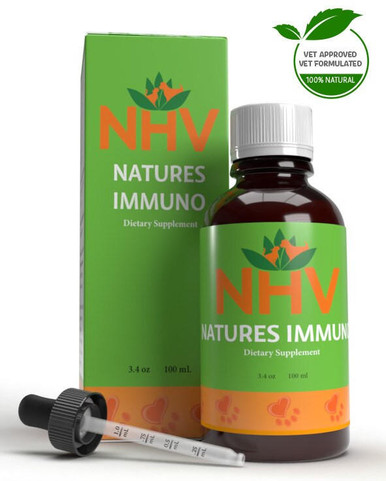
Natures Immuno is formulated for dogs from Turkey Tail, Cordyceps, Reishi, Shiitake, and Agaricus mushrooms by a holistic veterinarian and master herbalist. Medicinal mushrooms like these have been used for thousands of years in Chinese medicine as well as traditional herbalism. Researchers around the globe are now studying their potential in helping with cancer, balancing the immune system, and helping with digestive problems and more.

Natures Immuno Medicinal Mushroom blend for dogs also helps:
Medicinal mushrooms and mushroom extracts are used worldwide to help fight cancer and to help enhance and modulate the immune response of both people and animals. NHV’s mushroom blend contains 5 species of medicinal mushrooms for dogs, which have a long history of use, are well studied, and have been credited with having success against cancer as well as having antioxidant, hypocholesterolemia, anti-tumor, immunomodulatory, anti-allergic, nephroprotective, prebiotic, immunostimulant, anti-inflammatory, cardiovascular, and anti-diabetic properties
Properties of these Medicinal Mushrooms
Benefits of Natures Immuno Medicinal Mushrooms Blend for Dogs
You can read more about medicinal mushrooms for dogs and how they help give added support to pets for cancer and immunity.
NHV carries a wide range of holistic, natural vet-approved remedies that provide support along with a vet-recommended treatment plan. If you have questions about any of our plant-based supplements, ask an NHV expert, because, at NHV, we want your pet to live healthier and longer naturally.
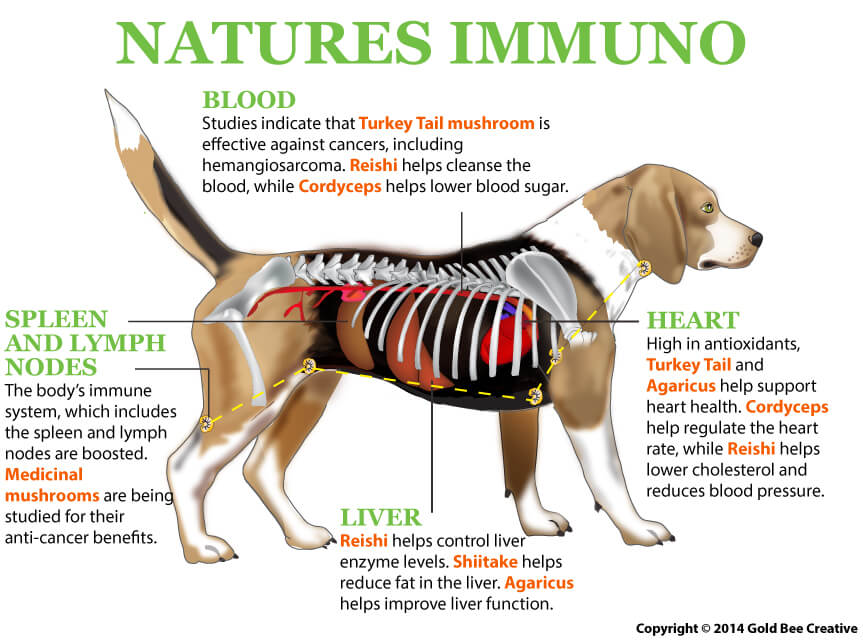
Turkey Tail mushroom is native to Asia, North America, and Europe. It has a long history of use in traditional herbalism and is currently being studied for its health benefits, including its value in fighting cancer. Research has shown that Turkey Tail is beneficial for many types of cancer as it contains properties that help fight cancer cells while helping to strengthen the immune system. Turkey tail mushroom for dogs has shown to be beneficial in spleen and liver hemangiosarcoma in dogs. It is also useful for heart health, lowering cholesterol, digestive issues, and skin problems.
Cordyceps mushroom is very rich in phytonutrients. Research has indicated that these mushrooms demonstrate anti-tumor, immune enhancing and hypoglycemic activity. It has anti-inflammatory, antioxidant, anti-tumor, anti-cancer, antimetastatic, and antiviral properties. It is very useful for diabetes as it helps lower blood sugar. Cordyceps also help enhance lymphocyte activity, which balance the immune system.
Reishi mushroom has been used for thousands of years in traditional Chinese medicine. It helps detoxify the blood, helps lower cholesterol and reduces blood pressure. It is also beneficial for the lymphatic system, which helps with a dog’s immunity.
Shiitake mushroom is a popular ingredient in cooking and is highly valued in traditional herbalism for its immune stimulating properties. It helps reduce fat in the liver, helps lower cholesterol, and is beneficial for heart health as it aids in reducing plaque in the arteries. Shiitake may help inhibit the growth of leukemia cells. Shiitake is also a good source of protein, vitamins, and minerals.
Agaricus mushroom is cultivated widely for dietary supplements and culinary purposes. Agaricus is useful for bone health, and helps with insulin production and helps with liver function. Agaricus is considered an adaptogen, which helps combat stress and supports the endocrine functions. This mushroom is currently used in Japan as an adjunctive with chemotherapy treatments.
Select your pet's weight to determine the correct dose.
To be taken twice daily.
Determine your pet’s weight and then use the easy chart below to determine the correct dose. You can safely double the recommended dosage.
Pet's Weight Dosage
0 - 15 lb 0.5 mL
16 - 30 lb 1.0 mL
31 - 45 lb 1.5 mL
46 - 60 lb 2.0 mL
61 - 75 lb 2.5 mL
Over 75 lb 3.0 mL
For small animals (rabbits, ferrets), avians and reptiles use 1 drop for every 2 lb of body weight.
How to Administer
Shake well before use. The easiest method is to use the dropper provided and place the drops into your pet’s food or favorite treat. You can also use the dropper and squirt directly into the pet’s mouth. Some pets can be finicky, if this occurs consider hiding the drops in foods most pet’s love such as fish, chicken, yogurt, or a favorite treat. If your pet only eats dry food then soak a few kibbles at feeding time.
For Best Results
Herbal dietary supplements are beneficial to the health and well-being of your pet and are safe for long-term use. Every pet responds to natural herbal supplements differently, therefore it is important to be consistent and administer the product daily. Supplements generally take two to four weeks to take effect, however this will vary from one animal to the next.
Product Storage
All NHV Natural Pet Products are pure herbal extracts and contain no artificial additives, preservatives or coloring. Shelf life after opening is 6 months and must be refrigerated after opening.
Natures Immuno Medicinal Mushroom blend for dogs also helps:
Medicinal mushrooms and mushroom extracts are used worldwide to help fight cancer and to help enhance and modulate the immune response of both people and animals. NHV’s mushroom blend contains 5 species of medicinal mushrooms for dogs, which have a long history of use, are well studied, and have been credited with having success against cancer as well as having antioxidant, hypocholesterolemia, anti-tumor, immunomodulatory, anti-allergic, nephroprotective, prebiotic, immunostimulant, anti-inflammatory, cardiovascular, and anti-diabetic properties
Properties of these Medicinal Mushrooms
Benefits of Natures Immuno Medicinal Mushrooms Blend for Dogs
You can read more about medicinal mushrooms for dogs and how they help give added support to pets for cancer and immunity.
NHV carries a wide range of holistic, natural vet-approved remedies that provide support along with a vet-recommended treatment plan. If you have questions about any of our plant-based supplements, ask an NHV expert, because, at NHV, we want your pet to live healthier and longer naturally.

Turkey Tail mushroom is native to Asia, North America, and Europe. It has a long history of use in traditional herbalism and is currently being studied for its health benefits, including its value in fighting cancer. Research has shown that Turkey Tail is beneficial for many types of cancer as it contains properties that help fight cancer cells while helping to strengthen the immune system. Turkey tail mushroom for dogs has shown to be beneficial in spleen and liver hemangiosarcoma in dogs. It is also useful for heart health, lowering cholesterol, digestive issues, and skin problems.
Cordyceps mushroom is very rich in phytonutrients. Research has indicated that these mushrooms demonstrate anti-tumor, immune enhancing and hypoglycemic activity. It has anti-inflammatory, antioxidant, anti-tumor, anti-cancer, antimetastatic, and antiviral properties. It is very useful for diabetes as it helps lower blood sugar. Cordyceps also help enhance lymphocyte activity, which balance the immune system.
Reishi mushroom has been used for thousands of years in traditional Chinese medicine. It helps detoxify the blood, helps lower cholesterol and reduces blood pressure. It is also beneficial for the lymphatic system, which helps with a dog’s immunity.
Shiitake mushroom is a popular ingredient in cooking and is highly valued in traditional herbalism for its immune stimulating properties. It helps reduce fat in the liver, helps lower cholesterol, and is beneficial for heart health as it aids in reducing plaque in the arteries. Shiitake may help inhibit the growth of leukemia cells. Shiitake is also a good source of protein, vitamins, and minerals.
Agaricus mushroom is cultivated widely for dietary supplements and culinary purposes. Agaricus is useful for bone health, and helps with insulin production and helps with liver function. Agaricus is considered an adaptogen, which helps combat stress and supports the endocrine functions. This mushroom is currently used in Japan as an adjunctive with chemotherapy treatments.
Select your pet's weight to determine the correct dose.
To be taken twice daily.
Determine your pet’s weight and then use the easy chart below to determine the correct dose. You can safely double the recommended dosage.
Pet's Weight Dosage
0 - 15 lb 0.5 mL
16 - 30 lb 1.0 mL
31 - 45 lb 1.5 mL
46 - 60 lb 2.0 mL
61 - 75 lb 2.5 mL
Over 75 lb 3.0 mL
For small animals (rabbits, ferrets), avians and reptiles use 1 drop for every 2 lb of body weight.
How to Administer
Shake well before use. The easiest method is to use the dropper provided and place the drops into your pet’s food or favorite treat. You can also use the dropper and squirt directly into the pet’s mouth. Some pets can be finicky, if this occurs consider hiding the drops in foods most pet’s love such as fish, chicken, yogurt, or a favorite treat. If your pet only eats dry food then soak a few kibbles at feeding time.
For Best Results
Herbal dietary supplements are beneficial to the health and well-being of your pet and are safe for long-term use. Every pet responds to natural herbal supplements differently, therefore it is important to be consistent and administer the product daily. Supplements generally take two to four weeks to take effect, however this will vary from one animal to the next.
Product Storage
All NHV Natural Pet Products are pure herbal extracts and contain no artificial additives, preservatives or coloring. Shelf life after opening is 6 months and must be refrigerated after opening.
liver support
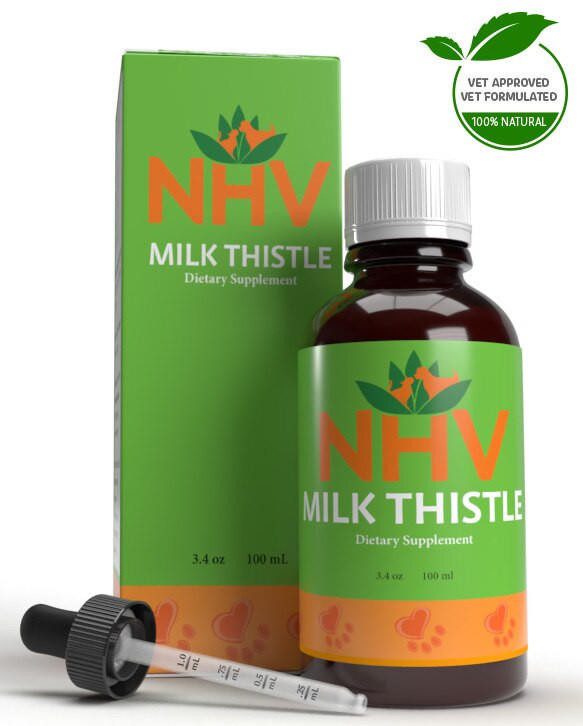
100% Natural Liver and Kidney Detox and Cancer Support in Cats
buy 2 and save $3
3 month supply for a small to medium size pet
A popular herb among conventional and holistic veterinarians, Milk Thistle is often recommended for cats who have liver disorders, are fighting cancer, diabetes, kidney issues, gallbladder and bile duct issues, as well as hyperthyroidism.

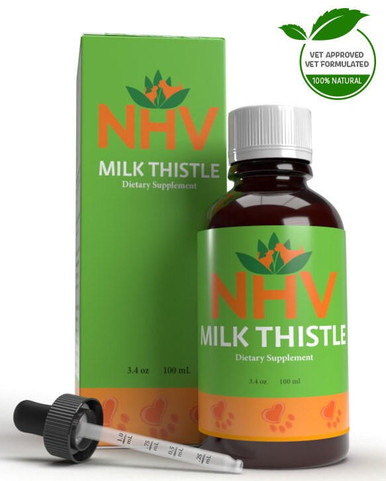
A popular herb among conventional and holistic veterinarians, Milk Thistle is often recommended for cats who have liver disorders, are fighting cancer, diabetes, kidney issues, gallbladder and bile duct issues, as well as hyperthyroidism.

Milk thistle, also known as Silybum Marianum is an herb that has been used for thousands of years by humans for its powerful medicinal properties. The active ingredient is Silymarin which contains flavonoids that have many beneficial properties including:
Milk thistle is one of the few herbs that have no equivalent in conventional medicine and has many uses. You can read about the many applications of Milk Thistle for cats and dogs on Dr. Hillary Cook's blog.
Milk Thistle for Liver Function
Milk Thistle for cats with liver disease is glycerin-based and safe for long-term use. This potent herbal formula provides excellent proactive support and can be taken in conjunction with conventional treatment.
Milk Thistle for Kidney Function
Milk Thistle for Anti-Cancer Support
Milk Thistle may also be beneficial to cats undergoing chemotherapy as Silymarium may enhance the activity of certain chemo drugs.
You can read Peachez's Story with Milk Thistle for cats and how it helped her with cancer and liver problems.
NHV’s certified organic Milk Thistle is a safe herb that is recommended and used by holistic practitioners. All of our products are all-natural and formulated by veterinarians with a focus on comprehensively supporting the health and well-being of your feline family member.
If you have questions about Milk Thistle or any of our plant-based products, ask an NHV expert because at NHV we want your kitty’s health to be purrfect!
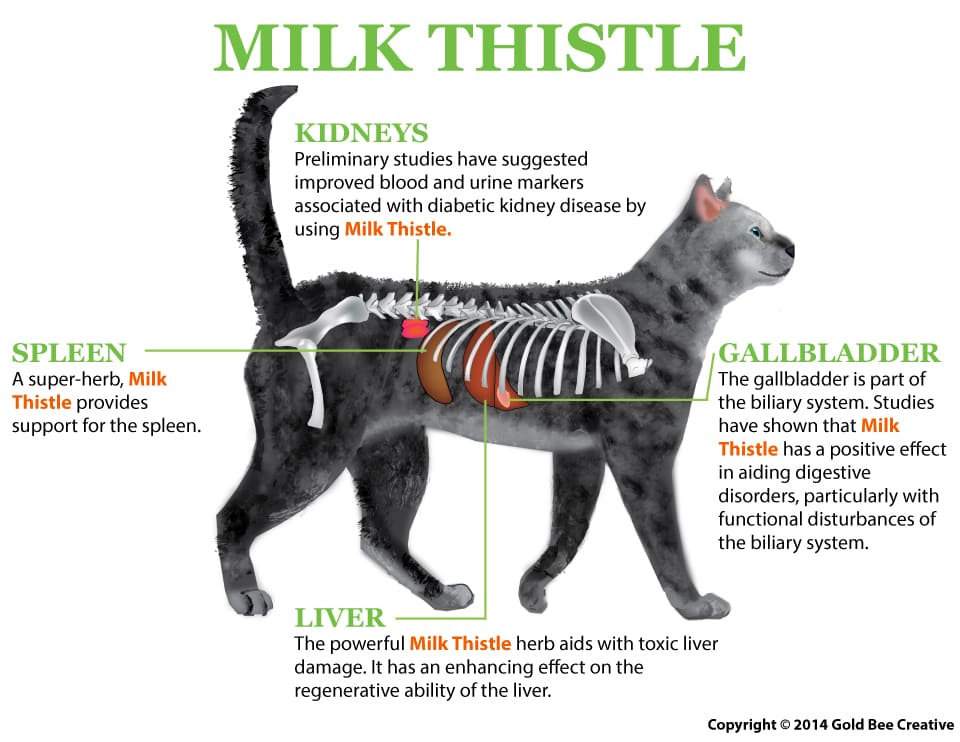
NHV’s Milk Thistle for Cats contains just one ingredient.
Select your pet's weight to determine the correct dose.
To be taken twice daily. Determine your pet’s weight and then use the easy chart below to determine the correct dose. This is the minimum dosage.
Pet's Weight Dosage
0 - 15 lb = 0.5 ml
16 - 30 lb = 1.0 ml
31 - 45 lb = 1.5 ml
46 - 60 lb = 2.0 ml
61 - 75 lb = 2.5 ml
Over 75 lb = 3.0 ml
How to Administer
Shake well before use. The easiest method is to use the dropper provide and places the drops into your pet’s food or favorite treat. You can also use the dropper and squirt directly into the pet’s mouth.
Some pets can be finicky, if this occurs consider hiding the drops in foods most pet’s love such as fish, chicken or yogurt or a favorite treat. If your pet only eats dry food then soak a few kibbles at feeding time.
For Best Results
Herbal dietary supplements are beneficial to the health and wellbeing of your pet and are safe for long-term use. Every pet responds to natural herbal supplements differently, therefore it is important to be consistent and administer the product daily. Supplements generally take two to four weeks to take effect, however this will vary from one animal to the next.
Product Storage
All NHV Natural Pet Products are pure herbal extracts and contain no artificial additives, preservatives or coloring. Shelf life after opening is 6 months and must be refrigerated after opening.
Cautions and Contraindications
Do not use Milk Thistle in pregnant or nursing animals. Speak to your vet before using our products. A second visit is recommended if your pet’s condition does not improve, or deteriorates after continued use of the supplements.
All information provided by NHV Natural Pet Products is for educational purposes only.
Milk thistle, also known as Silybum Marianum is an herb that has been used for thousands of years by humans for its powerful medicinal properties. The active ingredient is Silymarin which contains flavonoids that have many beneficial properties including:
Milk thistle is one of the few herbs that have no equivalent in conventional medicine and has many uses. You can read about the many applications of Milk Thistle for cats and dogs on Dr. Hillary Cook's blog.
Milk Thistle for Liver Function
Milk Thistle for cats with liver disease is glycerin-based and safe for long-term use. This potent herbal formula provides excellent proactive support and can be taken in conjunction with conventional treatment.
Milk Thistle for Kidney Function
Milk Thistle for Anti-Cancer Support
Milk Thistle may also be beneficial to cats undergoing chemotherapy as Silymarium may enhance the activity of certain chemo drugs.
You can read Peachez's Story with Milk Thistle for cats and how it helped her with cancer and liver problems.
NHV’s certified organic Milk Thistle is a safe herb that is recommended and used by holistic practitioners. All of our products are all-natural and formulated by veterinarians with a focus on comprehensively supporting the health and well-being of your feline family member.
If you have questions about Milk Thistle or any of our plant-based products, ask an NHV expert because at NHV we want your kitty’s health to be purrfect!

NHV’s Milk Thistle for Cats contains just one ingredient.
Select your pet's weight to determine the correct dose.
To be taken twice daily. Determine your pet’s weight and then use the easy chart below to determine the correct dose. This is the minimum dosage.
Pet's Weight Dosage
0 - 15 lb = 0.5 ml
16 - 30 lb = 1.0 ml
31 - 45 lb = 1.5 ml
46 - 60 lb = 2.0 ml
61 - 75 lb = 2.5 ml
Over 75 lb = 3.0 ml
How to Administer
Shake well before use. The easiest method is to use the dropper provide and places the drops into your pet’s food or favorite treat. You can also use the dropper and squirt directly into the pet’s mouth.
Some pets can be finicky, if this occurs consider hiding the drops in foods most pet’s love such as fish, chicken or yogurt or a favorite treat. If your pet only eats dry food then soak a few kibbles at feeding time.
For Best Results
Herbal dietary supplements are beneficial to the health and wellbeing of your pet and are safe for long-term use. Every pet responds to natural herbal supplements differently, therefore it is important to be consistent and administer the product daily. Supplements generally take two to four weeks to take effect, however this will vary from one animal to the next.
Product Storage
All NHV Natural Pet Products are pure herbal extracts and contain no artificial additives, preservatives or coloring. Shelf life after opening is 6 months and must be refrigerated after opening.
Cautions and Contraindications
Do not use Milk Thistle in pregnant or nursing animals. Speak to your vet before using our products. A second visit is recommended if your pet’s condition does not improve, or deteriorates after continued use of the supplements.
All information provided by NHV Natural Pet Products is for educational purposes only.
Published: October 11, 2023